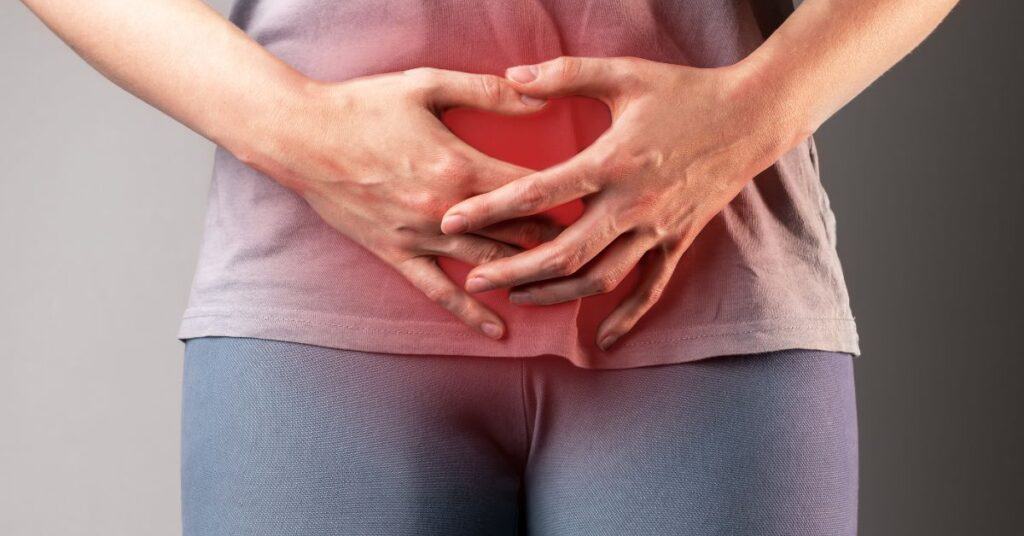Table of Contents
- How Fragrance Soap Can Cause UTIs
- What Products & Soaps Can Cause UTI?
- What Are The Symptoms Of UTIs
- Will UTI Go Away On Its Own?
- What Is The Fastest Way To Cure A UTI?
- Conclusion
Can fragrance soap cause UTI? No! However, fragrance soaps you use to wash your genitals could increase your risk of getting a UTI.
Urinary tract infections (UTIs) are unpleasant infections affecting the bladder, urethra, or kidneys.
They can cause symptoms such as burning or painful urination, frequent or urgent urination, blood in the urine, lower abdominal pain, fever, or back pain.
UTIs are more common in women than men.
And can be caused by various factors, such as sexual activity, pregnancy, fragranced soap or products, diabetes, kidney stones, or anatomical abnormalities.
In this blog post, I will explain how fragrance soap can cause UTIs and the products needed to clean the vulvar.
How Fragrance Soap Can Cause UTIs
The skin around the genitals and the urinary tract is sensitive and delicate and needs to maintain a certain pH balance and bacterial flora to prevent infections.
Fragrance soaps, especially those that contain harsh chemicals, artificial colors, or
synthetic perfumes, can disrupt this balance and irritate the skin and mucous membranes.
This can create an environment that allows harmful bacteria, such as E. coli, klebsiella, enterococcus, and Sierrtia, to grow and enter the urinary tract, causing an infection.
Fragrance soap can also cause allergic reactions or contact dermatitis, resulting in inflammation, itching, redness, or rash around the genitals or the urethra.
These symptoms can mimic or worsen the symptoms of a UTI and make it harder to urinate or empty the bladder.
UTI is common among females 4:1 because they have a shorter urethra than males, and the bacteria don’t have a lot of distance to climb the bladder.
Particularly females between the age of 16-35.
This can also increase the chances of bacterial growth and infection.
The vagina has an acidic pH, a natural defense to fight infections.
There is an entire system of defenses that prepares it “for the trauma of sexual intercourse,”
The vaginal microbiota is “the one that defends us from all microorganisms that are pathogenic and cause us diseases.”
The problem arises when there are changes, such as bacterial vaginosis, which is an alteration of the microbiota.
“Some germs, instead of being present in normal quantities, increase in quantity precisely because of an increase or decrease in pH.”
One of the causes of this imbalance in the genital area is the use of fragrance soaps, products containing essential oils, and scented pads.
What Products & Soaps Can Cause UTI?
– Fragrance soap or other harsh or scented hygiene products, feminine washes like summer’s Eve, vagisil, and Honeypot.
These products disrupt the pH balance and bacterial flora of the genitals and the urinary tract and irritate the skin and mucous membranes.
They contain fragrances, essential oils, irritants, and harmful substances that damage the genital organs.
They cause allergic reactions and irritations, and if you use them for a period of years, you could develop a sensitivity.
Maybe you’ve been told you need these washes or a physician recommended them, but you don’t.
NOTE: THE VIGINA IS A SELF CLEANING ORGAN.
Anytime you squint anything over there , even water you are disrupting the good bacterial says Dr, Jennifer Lincoln
And they are from the feminine hygiene industry that loves to make money off you by making you feel dirty.
Take note nothing is needed to clean the inside of your Vagina. You can only clean outside the vulvar.
This can create an environment that allows harmful bacteria to grow and enter the urinary tract, causing an infection.
– Certain types of contraception, especially diaphragms with spermicidal agents.
These products can also alter the pH balance and bacterial flora of the vagina and the urinary tract and increase the risk of bacterial growth and infection.
– Caffeine, alcohol, spicy foods, sugar, artificial sweeteners, citrus fruits, and juices.
These foods and drinks can irritate the bladder and the urethra and worsen the symptoms of a UTI.
Diabetes patients, patients with spinal cord injuries, are susceptible to UTI.
They can also dehydrate the body and reduce the urine output, making it harder to flush out the bacteria from the urinary tract.
– Regular use of antibacterial soaps may alter the natural flora on the skin, potentially affecting the bacteria in the urethral and genital areas.
Disruption of this balance can contribute to an increased risk of UTIs.
– Bubble baths and harsh cleansers can irritate the urethral and genital tissues, making it easier for bacteria to ascend the urinary tract.
Opting for mild, fragrance-free alternatives is advisable.
– Douching can disrupt the natural balance of bacteria in the vagina and may push bacteria into the urethra, leading to UTIs.
The American College of Obstetricians and Gynecologists (ACOG) advises against routine douching.
– Wet wipes containing fragrances, harsh chemicals, and rough or scented toilet paper can potentially irritate the genital area.
This irritation may contribute to UTI risk, primarily when used frequently.
– Wearing tight underwear or undergarments made from synthetic materials can create a warm, moist environment, promoting bacterial growth.
This can increase the likelihood of UTIs.
– Unsterilized Catheters: Ensuring proper sterilization and hygiene is crucial for individuals using catheters.
Improperly sterilized catheters can introduce bacteria into the urinary tract, leading to infections.
What Are The Symptoms Of UTIs
Frequency + urgency: you pee more often and find it difficult to hold on to your pee. This is because the bladder becomes inflamed and irritable and contracts frequently.
Dysuria: you get burning or stinging in the urethra when you’re passing urine. This is because the lining of the urethra has become inflamed and swollen.
Haematuria: Your urine may be pink or red. This happens if the infection and inflammation are severe enough that it causes bleeding from the bladder into the urine.
Suprapubic Discomfort: You have lower abdominal pain. This is because of inflammation and swelling of the bladder, which is low in the pelvis.
Cloudy + offensive Urine:
The urine may be cloudy and have bits floating in it because the infection causes white blood cells, pus, and infected bladder cells to become suspended in the urine.
It can smell offensive because certain bacteria break down chemical compounds in the urine to give smelly byproducts.
Lower back pain: You may have lower back pain and fever because pain from your bladder can be felt in other parts of the body that share the same spinal nerve supply.
Will UTI Go Away On Its Own?
The patient’s immune system can treat UTI in many patients.
When it comes to keeping the genital area or vulvar clean, remember LESS IS MORE.
So, 30% to 40% of patients can deal with their infection.
However, as you get older, you tend to have less ability to deal with infections, which can lead to significant disease.
As earlier stated, if you have an underlying problem such as diabetes, then the chance of dealing with an infection tends to be limited.
In this case, it is important to receive prompt medical care, say, Dr. Mohammed Belal MA, MB, Bchir, and FRCS consultant Urologist.
While waiting for your doctor’s appointment, you can try some home remedies to help relieve your symptoms and prevent the infection from worsening.
Some of these remedies include:
– Drinking plenty of fluids to flush out the bacteria and toxins from your urinary tract.
– Urinating when needed to avoid holding the urine in your bladder, which can increase the risk of bacterial growth and infection.
Minimize your sugar and processed food intake because sugar feeds these bacteria.
Consider taking fruits like cranberry; they contain elements that can divert the bacteria from sticking.
– Taking vitamin C helps boost your immune system and lowers your urine’s pH, making it more acidic and less favorable for bacterial growth. It helps to repair tissues
In addition to these remedies, you should also practice good hygiene to prevent the spread of bacteria and reduce the risk of recurrent UTIs.
Some hygiene tips include:
– Wiping from front to back after urinating or defecating to avoid transferring bacteria from the rectum to the urethra.
– Urinating after having sex to help flush out any bacteria that may have entered the urinary tract during sexual activity.
– Avoid diaphragms and spermicide condoms, which may alter the pH balance
and bacterial flora of the vagina and the urinary tract and increase the risk of bacterial growth and infection.
What Is The Fastest Way To Cure A UTI?
Drink water
Pee after sexual intercourse and take showers instead of baths.
Wear cotton pants and change your underwear daily.
If you can’t treat UTL after all these tips, it is time to visit your doctor.
The doctor might recommend antibiotics like Nitrofurantoin sustained-release tablets,
cephalexin capsules, ceftriaxone, Trimethoprim, fosfomycin, and painkillers to lower back pain.
If you are frequently dealing with UTI, your doctor might tell you to take the
recommended drugs for six months or start with estrogen therapy in post-menopause women.
The fastest way to cure a UTI is to take antibiotics prescribed by a doctor, which kill the bacteria that cause the infection.
You must finish the entire course of antibiotics to prevent the infection from returning.
Some home remedies, such as drinking plenty of water, cranberry juice,
probiotics, vitamin C, and garlic, may help to ease the symptoms and prevent a recurrence.
Still, they are not substitutes for medical treatment.
You should see a doctor if your symptoms last longer than two days or worsen.
Some conditions, such as sexually transmitted infections or vaginal infections, can mimic symptoms of a UTI, so it’s essential to get the proper diagnosis and treatment.
Conclusion
While scented soap alone may not directly cause a UTI, it can contribute to an environment conducive to infections, especially in individuals with frequent use.
Practicing good hygiene, choosing suitable products, and maintaining a healthy lifestyle are essential in preventing urinary tract infections.
If you experience recurrent UTIs or persistent symptoms, consulting a healthcare professional is crucial for accurate diagnosis and appropriate management.



